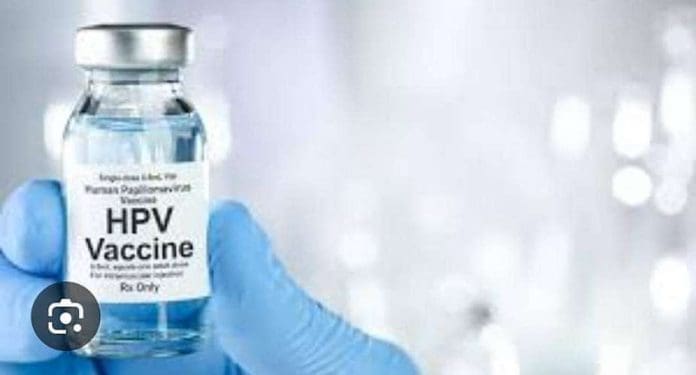Ghana’s Central Regional Health Director has clarified that the government’s Human Papillomavirus vaccination campaign targets all girls aged 9 to 14 regardless of school type, urging private and mission schools to stop blocking access to vaccines that could prevent thousands of cervical cancer deaths annually.
Dr. Alberta Biritwum-Nyarko told a press briefing in Cape Coast that some private school administrators have resisted allowing Ghana Health Service teams to vaccinate eligible students, creating dangerous gaps in coverage that leave girls vulnerable to a preventable cancer that kills approximately 1,700 Ghanaian women each year.
“It is very important for all of us to note that this vaccination is not going only for government schools but it is going for all schools in the country, whether it is a mission school or privately owned school, because what is good for government is also good for non-government,” Biritwum-Nyarko said.
The clarification comes as health officials confront persistent misinformation about HPV vaccines, including false claims that the shots cause infertility or carry other serious health risks. These myths have gained traction on social media and in some religious communities, creating vaccine hesitancy that threatens to undermine the campaign’s effectiveness.
Biritwum-Nyarko directly addressed the conspiracy theories, emphasizing that health officials would never promote interventions that harm children.
“It is important that we understand that government or the Ghana Health Service is not peddling something that will kill our girls,” she said. “We are not peddling something that will cause infertility in the future of our girls. We are not doing anything that will be inimical to the health of the people of the country, since we are all mothers and parents.”
The distinction between public and private school access to vaccines matters because private institutions often serve wealthier families who may have more resources to seek medical care but whose children still need preventive vaccinations. If private schools opt out of the campaign, they create pockets of unvaccinated girls who remain at risk despite their families’ economic advantages.
The Central Regional Health Directorate has targeted 209,221 girls for vaccination, according to Deputy Director of Public Health Dr. Jojo Cobbinah. That ambitious target requires cooperation from all educational institutions rather than relying solely on government schools where health teams face fewer access barriers.
Cobbinah revealed that Ghana recorded nearly 2,800 new HPV cases and 1,700 related deaths in 2020 alone, figures that underscore the disease burden the vaccination campaign aims to prevent. Those deaths represent women who might still be alive if they had received HPV vaccines as adolescents decades earlier.
The deputy director noted that 70 percent of women diagnosed with cervical cancer in Ghana are identified only after the disease reaches advanced stages, when treatment options become limited and survival rates drop dramatically. Late stage detection reflects both inadequate screening programs and the reality that early cervical cancer produces no symptoms, making prevention through vaccination particularly critical.
HPV vaccines have been extensively studied globally and proven safe and effective at preventing the viral infections that cause most cervical cancers. The World Health Organization recommends HPV vaccination for girls aged 9 to 14, before they become sexually active and potentially exposed to the virus.
Countries with high HPV vaccination coverage have already documented dramatic reductions in cervical cancer rates among vaccinated cohorts. Australia, which implemented universal HPV vaccination in 2007, is on track to virtually eliminate cervical cancer within decades. That success story demonstrates what Ghana could achieve with comprehensive vaccine coverage.
However, reaching that coverage requires overcoming resistance from parents influenced by misinformation and from institutions that either share those concerns or simply prefer not to disrupt school schedules for vaccination exercises. Private schools particularly may feel pressure from tuition paying parents who oppose vaccination, creating conflicts between public health goals and customer satisfaction.
Biritwum-Nyarko appealed to media organizations to support public education about HPV vaccine safety and benefits, recognizing that journalists can either amplify misinformation or help counter it through accurate reporting. Media coverage that treats vaccine myths and scientific evidence as equally valid perspectives contributes to confusion rather than clarity.
The health director framed the vaccination campaign as an investment in girls’ futures, emphasizing that protecting them from cervical cancer enables them to pursue education, careers, and family life without the devastating interruption of cancer diagnosis and treatment.
Ghana’s cervical cancer burden falls disproportionately on women with limited access to regular screening and early treatment. While wealthier women can afford private gynecological care that might detect precancerous changes before they progress, poor women often seek medical attention only when symptoms appear, by which point cancer has typically reached advanced stages.
The vaccination campaign therefore represents a health equity intervention, offering protection to girls regardless of their families’ ability to pay for preventive care. But that equity goal requires reaching girls in all schools, not just those in government institutions.
Whether private and mission schools will cooperate with vaccination teams remains to be seen. Health officials can appeal to administrators’ sense of social responsibility and student welfare, but lack enforcement mechanisms to compel participation if schools refuse access.
The campaign’s ultimate success depends on achieving high coverage rates that provide population level protection. Missing significant numbers of girls because their schools opt out would undermine that goal and perpetuate the cervical cancer burden that kills over a thousand Ghanaian women annually.
Source: newsghana.com.gh











